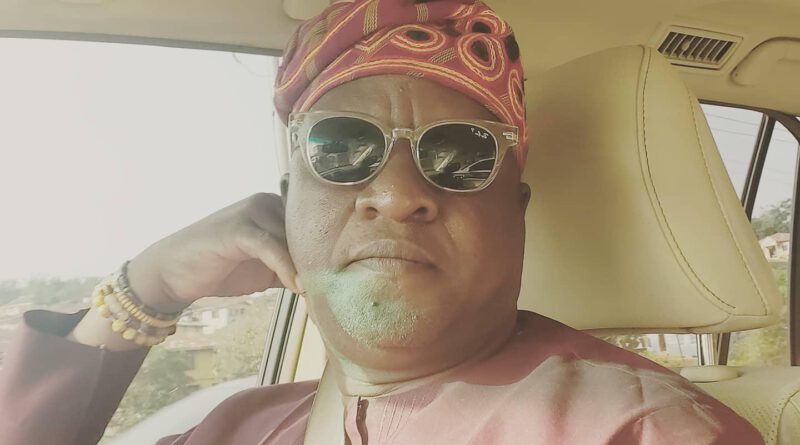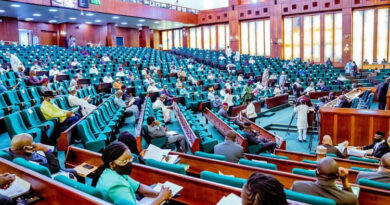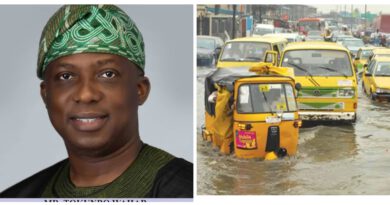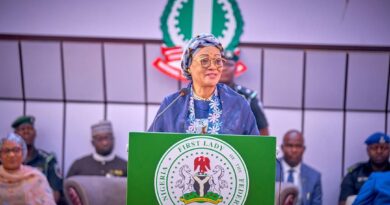The Propagandist Exposed: A Rejoinder to Steve Osuji by Kehinde Bamigbetan
Professional maturity is expected to come with experience on the job. After over three decades of reporting, writing and editing scripts, it is a pity that malicious propaganda has sent Steve Osuji down the hill to a catastrophic abyss. His petty and pitiable piece of malignant disinformation published in the papers and circulated on social media yesterday rankles.
Remote from the precincts of policy generation and formulation, far from the intellectual discourses and technical sessions on how best to give succour to the Nigerian people as fast as feasible at a time of great expectations of social transformation, Steve Osuji plays the abracadabra by turning his abysmal ignorance of the two-month administration’s plan to severe the cord that ties the common people to poverty, into empty Gargantuan jabbering, very vacuous, insidious and irresponsible grandstanding that infests the ego of that group of uncouth, unnurtured and uncultured spoilers of the eternal tenets of the Fraternity of the Pen.
Let us be a bit professional.
The media message that this malicious character assassin seeks to deploy to articulate his views is appropriately defined as informed commentary on the grounds that the objective of the exercise is to illuminate a controversial subject in terms of factual validity and logical consistency. It is expected that a piece of informed commentary is like a synopsis of a presentation that includes a literature review, description, conclusion and recommendations. Those canvassed for and against are expected to take away lessons solid enough to be applied to the reformulation of solutions to the problems.
Informed Commentary is the heritage of the Enlightenment and the Age of Reason: a celebration of ideas delivered in literary prose, concrete, incontrovertible facts and persuasive logic; a tradition in which words are swords that cut yet no blood drops; emotions rise and fall in tandem with the craft of expression.
Instead, Osuji pours into this media message toxic content full of abuses, denigrations and expletives. Rarely could you find a well-structured valid argument of premises and conclusion. He offers his hallelujah choir crass and crazy merchandising of the socio-economic anomie whose historic pedigree is well known to be decades old.
While this administration will not be distracted by the malicious naysayers, we will, in the consistent, comprehensive tradition of our political tendency forged in the furnace of democratic struggles,turn every attack of the opposition to an opportunity to educate and orientate, then leave them to their conscience to choose the path of destruction or restitution.
Osuji disagrees with Mr. Dele Alake on the rebuttal of the report of the European Union Election Observation Mission on the 2023 election. The question, is, has Osuji read the report? There is no statement in his commentary that demonstrates that he is conversant with even the executive summary of the report.
The purpose of inviting observers to an election is to ensure that international best practices are applied in the operations. A fundamental assumption is that the electoral laws of the country are respected, that facts are sacred and separated from opinions and there is no attempt to undermine post-election peace and tranquility.
To the contrary, the EU report violates a lot of these standard expectations. First, it opposes the Nigerian constitutional provision for the composition of INEC, noting that “the presidential selection of INEC leadership at federal and state level leaves the electoral institution vulnerable to the perception of partiality.” Second, it berates constitutional provisions on enforcement of electoral offences stating as one of the weaknesses of the Electoral Act 2022 INEC’s lack of independence and capacities to enforce sanctions for electoral offences and breaches of campaign finance rules. These constitutional issues are matters beyond INEC.
The provision for the presidential nomination of INEC members is balanced by the approval of the National Assembly; the enforcement of electoral offences by the police and the prosecution of campaign finance offenders by the National Financial Intelligence Unit.
Take its negative portrayal of efforts of all the parties to open up the party primary for women aspirants. For example, it is a fact that APC announced as part of its guidelines that women aspirants would not pay for the contest forms. The report refused to acknowledge this weighty intervention. Instead, it concluded that the emergence of few women candidates, “demonstrated a severe underrepresentation of women in political life and a lack of internal party policies to support inclusion, contrary to constitutional principles and international conventions.”
Its report on the performance of the press, particularly radio was full of ignorance and mischief: Read it: “analytical reporting was scanty… fearing retribution from the governor, many state-level outlets practiced self-censorship”. The poser: state and federal broadcast stations are 108 out of 625 stations in Nigeria. Why didn’t the report feature the dominant, uncensored private broadcast stations?.
The report engages in suspicious double speak on fundamental freedoms. Thus in one breath, it claimed that “fundamental freedoms of assembly and movement were well respected yet the full enjoyment of the latter was impeded by insecurity” and that “fundamental freedoms of assembly, association and expression, while constitutionally guaranteed, were not always well protected”.
Despite the high level of vibrancy of the Nigerian social media particularly during the campaign, it is shocking that the EU reported that “police in-action, compounded by institutional pressures impeded freedom of expression and hindered voters access to diverse information on electoral choices”! It also alleged that “authorities often used the Cybercrimes Act to suppress Freedom of Expression online.”
These negative reportage was designed to arrive at the clearly prejudiced conclusion that INEC “ did not ensure a well –run transparent and inclusive democratic process.” Certainly, the premises and conclusion, what was reported and unreported point to a clear bias not out of tune with the foreign policy agenda that the Mission wanted to set for the European Union. It would have been foolhardy to let such red herring pass unchallenged.
Any fair, objective Nigerian would consider Mr. Alake’s rebuttal necessary to both national and government interests since the report went beyond brief by undermining the legitimacy of the democratic transition and endangering post –election peace and order.
If there is still a shred of patriotism in Osuji’s heart, he should get out of his banana republic mentality, decolonize his mind and stand proudly to defend his country’s march towards democracy. That is what over a century of journalism for social relevance has taught us.
However, if his ambition is to harass the functionaries of the administration with the nabobs of negativism, he would be wasting his time. For instance, his puerile comments on Mr. Dele Alake, so puny in research and penurious in courtesy, has already made the idea of anyone engaging in such self-ridicule seem like a blunt knife seeking a whetstone for sharpness. Very rare for any discerning or respectable fellow in any crowd of influence in the country’s power corridor to conjure the visage of this character mugger.
Over a decade ago, I and Segun Ayobolu published the book, Dele Alake: The Writer as Strategist. He should get a copy and educate himself before poisoning the public psyche with malicious rant.
To allege that a man who, for eight straight years, (1999 to 2007),managed the image of Lagos, Nigeria’s most industrialised state has no range; to allege that a former chairman, Editorial Board, Editor of Sunday Concord , Editor of National Concord and a Fellow of the Nigerian Guild of Editors has no rigour; to insinuate that a key strategist of the late winner of the June 12, 1993 polls, Bashorun MKO Abiola is unfit for office and to delude yourself that one of the influential political strategists that is universally acknowledged to have contributed to the actualization of the victory at the February 25 presidential polls is clueless, is,indeed, taking your sarah pass the mosque.
It is regrettable that Osuji is making a mess of journalism- the noble practice of well-informed citizenry – by turning it on its head with his devious disinformation campaign and calumniating persons called to serve the Federal Republic of Nigeria. His is no longer journalism for public service. It is propaganda in the struggle for power.
Fair game? So be it. By the grace of God and the votes of the majority of the voters in Nigeria, President Bola Tinubu has won the February 25, 2023 election in substantial compliance with the law. He will serve his term Insha Allah to the fullest extent provided by the Constitution. Good citizens will use the law that made it possible for him to be sworn in as the yardstick to measure their allegiance to the Nigerian State and the elected president. Bad citizens will do otherwise. But they should know that that the Presidency, after eight possible years, will still remain in Abuja. And a new person will still be elected to occupy the seat. Respecting the office of the Presidency is the duty of every good citizen. It is indeed an obvious measure of culture and civility.
Bamigbetan, erstwhile chairman of the Lagos State APC Tinubu-Shettima Campaign Publicity Committee, wrote from Lagos




